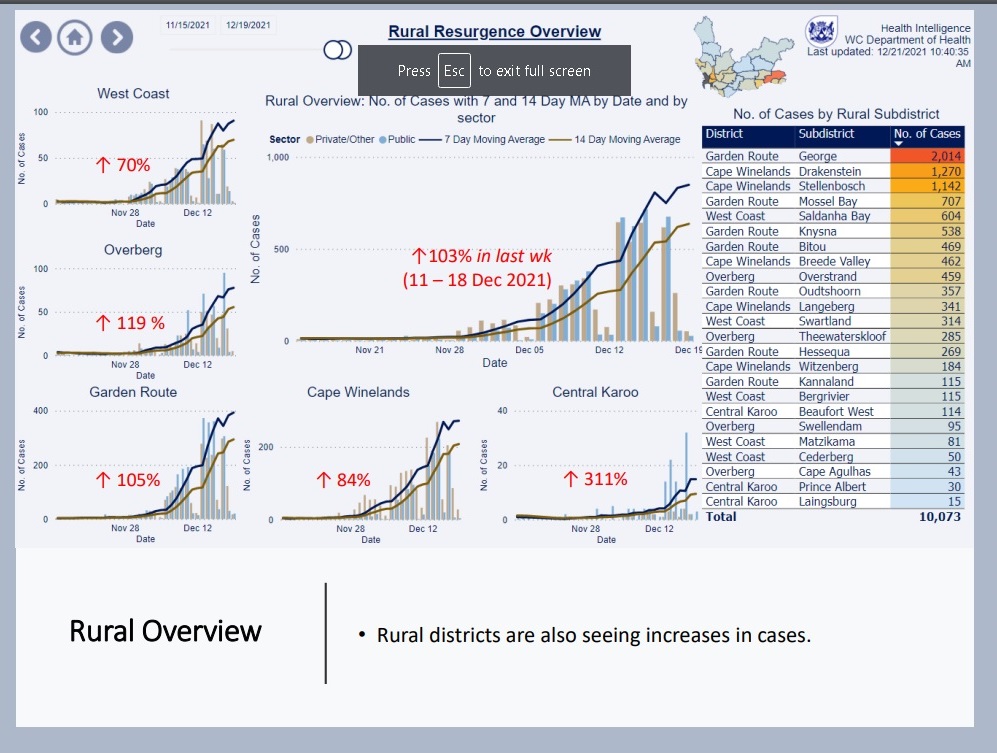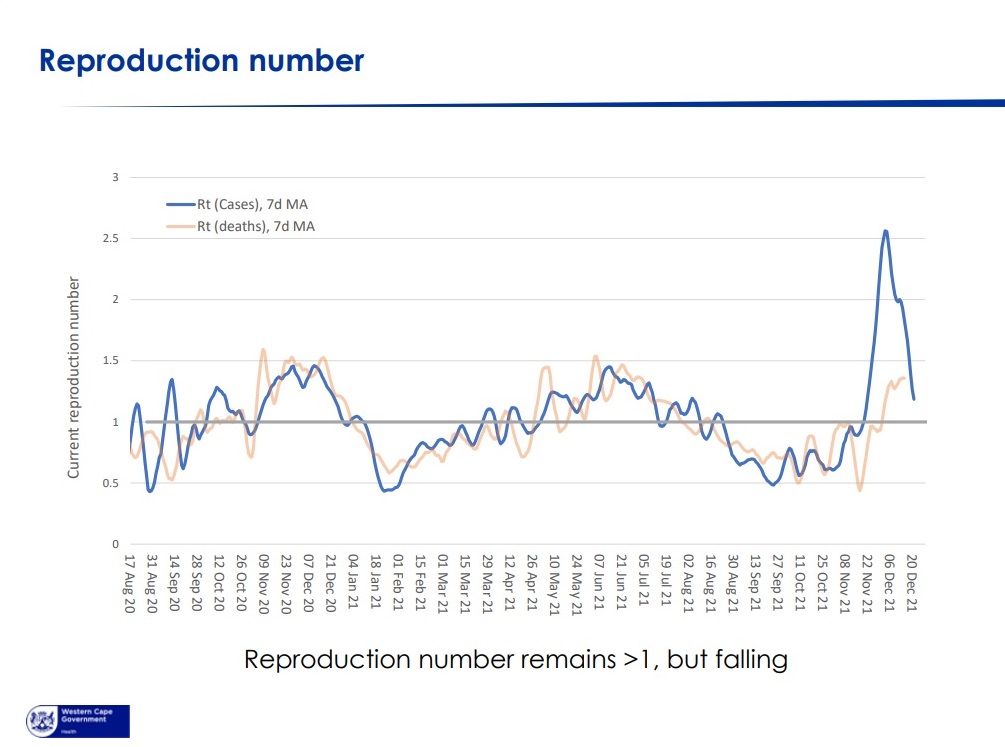WESTERN CAPE NEWS - The Western Cape Health Department reported this morning, Wednesday 22 December, that the increases in the number of daily new Covid-19 cases continue with an average of 3 383 new diagnoses per day, but the rate of increase has declined.
Premier Alan Winde said in a media statement that this is very positive news, but they will continue to monitor the number of cases, hospital admissions and deaths closely amid the fourth wave.
"Although the indications are positive, the province is not yet out of the woods and has not yet reached a peak.
"It is also reassuring to see that the South African Covid-19 Modelling Consortium’s (SACMC) short-term predictions are that actual case numbers continue to fit well with the prediction line for the past week. The SACMC is further expecting fewer cases in the coming week. It should however be noted that public holidays and restricted testing may affect testing patterns in the coming week."
He urged citizens to remain vigilant and prevent the spread of the virus through the lifesaving behaviours everyone has learnt throughout the pandemic. He said the vaccines have proven effective against severe disease, also with reference to the Omicron variant, but further robust information is still needed.
The reproduction or “R” number remains above 1, but is now declining.
The proportion of positive Covid-19 tests has increased to an average of 51% and hospital admissions are increasing with 138 admissions per day.
Deaths remain low with under 2 deaths a day.
“We have learnt many lessons about the Omicron variant but call on the scientific community to conclude their research speedily. What we have learnt, on a preliminary basis, to date is that a high proportion of re-infections occurs with Omicron. We are also seeing that the proportion of cases with severe disease to date has been lower. This is could be due to predominantly younger people getting infected, who are at lower risk of severe disease," said Winde.
"It is important to note there is no clear evidence that Omicron causes less severe disease in unvaccinated people without prior infection. The proportion of those who are infected and who get severe illness is smaller. This may be due to prior infection or vaccination, but those studies must still be completed."
There are sustained week-on-week increases of over 20% in hospital admissions, although these percentage increases are starting to decline, and hospitals are coping with the demand.
The current number of Covid-19 hospitalizations total at 826 based on a 7-day-moving average.
Covid-19 and persons under investigation cases currently make up 21% of all available acute general hospital capacity in both the metro and rural regional hospital drainage areas.
 The risk of hospital admission is lower in the fourth wave than in all the previous waves.
The risk of hospital admission is lower in the fourth wave than in all the previous waves.
 Cases in the rural areas are still increasing. The Garden Route has had a 119% increase over the past week.
Cases in the rural areas are still increasing. The Garden Route has had a 119% increase over the past week.
 The reproduction number in the Western Cape is still above 1 but is falling.
The reproduction number in the Western Cape is still above 1 but is falling.
46% vaccinated
By 21 December, the total percentage of persons fully vaccinated in the province stood at 46.01% of the total adult population or 2,29 million people. (Nationally 38.7% of the total adult population has been vaccinated.)
The total number of adults who have received at least one dose of the Covid-19 vaccine stands at 2 622 648 people or 53% of the total adult population. The total number of children aged between 12 – 17 years who are vaccinated stands at 105 757 or 16.36% of the total population.
Vaccination of different age groups:
- Of those 60 years and older, 66.53% of the total population are fully vaccinated; 4.82% are partially vaccinated and 28.64% are unvaccinated.
- Of those between 50 – 59 years, 57.6% of the total population are vaccinated, 4.85% are partially vaccinated and 37.55% are unvaccinated.
- Of those between 35 – 49 years, 48.58% of the total population are vaccinated; 6.13% are partially and 45.29% are unvaccinated.
- Of those between 18 – 34 years, 33.04% are fully vaccinated; 8.38% are partially vaccinated, and 58.58% are unvaccinated.
By 21 December, vaccinations administered in the Western Cape came to 4 424 972 and in the last 24 hours, the province administered 7 327 vaccines.
The premier encouraged eligible persons to come forward for their booster doses. Booster doses are currently available to healthcare workers through the Sisonke 2 programme and to immunocompromised persons.
By 21 December, 59 717 healthcare workers in the Western Cape (63.29% of eligible healthcare workers) had received a J&J booster dose.
The South African Health Productions Regulating Authority (Sahpra) has approved the use of the third Pfizer dose for the public, while Johnson & Johnson is still awaiting approval. It is expected that booster doses will be made available for the general population by January 2022.
Administerting of booster doses to immunocompromised people began on 1 December and by 21 December, 2 765 patients have accessed the additional vaccine dose in the Western Cape.
This includes persons who are 18 years and older, and are:
- HIV positive with a CD4 count less than 200 within the last 6 months;
- On long-term high dose oral steroid therapy or systemic biologics;
- Suffering from cancer involving bone marrow or blood;
- Without a spleen;
- On long-term renal dialysis; and
- Moderate to severe Primary Immunodeficiency Disorder (PID).
To qualify, people with the above conditions need a reference letter from their healthcare provider to state the specific condition. The additional dose can be given 1 to 3 months after the previous dose.
'We bring you the latest Garden Route, Karoo, Hessequa news'
















